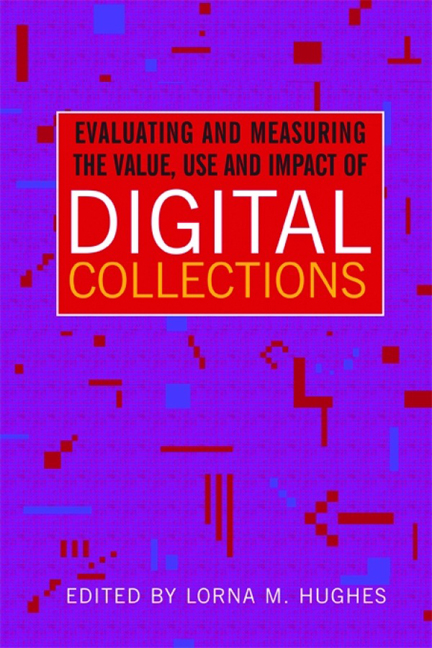Book contents
- Frontmatter
- Contents
- Figures and tables
- Foreword
- Acknowledgements
- The contributors
- 1 Introduction: the value, use and impact of digital collections
- Part 1 Digital transformations in libraries, museums and archives
- Part 2 Understanding and measuring the use, impact and value of digital collections
- Part 3 Enhancing the future impact and value of digital collections
- 9 Using ICT methods and tools in arts and humanities research
- 10 Creating a research data infrastructure: policy and practicalities
- 11 Improving sustainability of publicly funded digital resources
- References and further reading
- Index
- Miscellaneous Endmatter
- Miscellaneous Endmatter
9 - Using ICT methods and tools in arts and humanities research
from Part 3 - Enhancing the future impact and value of digital collections
Published online by Cambridge University Press: 08 June 2018
- Frontmatter
- Contents
- Figures and tables
- Foreword
- Acknowledgements
- The contributors
- 1 Introduction: the value, use and impact of digital collections
- Part 1 Digital transformations in libraries, museums and archives
- Part 2 Understanding and measuring the use, impact and value of digital collections
- Part 3 Enhancing the future impact and value of digital collections
- 9 Using ICT methods and tools in arts and humanities research
- 10 Creating a research data infrastructure: policy and practicalities
- 11 Improving sustainability of publicly funded digital resources
- References and further reading
- Index
- Miscellaneous Endmatter
- Miscellaneous Endmatter
Summary
Introduction: centralized support for arts and humanities digital scholarship in the UK
In the last two decades, digital resources for the arts and humanities have been developed via a number of initiatives and funding streams, primarily from organizations including JISC, the NEH (National Endowment for the Humanities), the Mellon Foundation, and other national and international initiatives. In the UK, the Arts and Humanities Research Council (AHRC), and its predecessor, the AHRB (Arts and Humanities Research Board) contributed greatly to the expansion in the production and exploitation of digital resources for arts and humanities research, primarily through the Resource Enhancement Scheme, which funded the development of a large number of digital resources during its existence, from 2000 to 2007.
It has recently been estimated that up to 50% of projects funded by the AHRC have some sort of digital output (AHRC, 2007). Thanks to strategic and responsive-mode funding opportunities for digitization, and uptake of these initiatives by libraries, archives and higher education institutions, there is now a critical mass of digital material produced by, and available to, arts and humanities researchers. Given that the source materials for arts and humanities scholarship are varied and complex, their digital surrogates are highly multimedia (Hughes, 2004). This massive expansion of digital resources is comparable, in its complexity if not its volume, to the ‘data deluge’ experienced by the ‘hard’ sciences in the same period (Hey and Trefethen, 2005) and has led to an increased adoption of digital scholarship in arts and humanities research and teaching. Digital resources have enabled transformative research projects in the humanities; one of the most significant medieval discoveries of recent years has been the identification of Chaucer's scribe – Adam Pinkhurst, about whom we now know a great deal – by Lynne Mooney of the University of York. This discovery would have been impossible without access to highquality digital images of manuscripts, which made it possible for Mooney to identify individual hands that worked on different manuscripts (Mooney, 2006). Examples of similar remarkable research using digital collections were the basis of the ACLS report, Our Cultural Commonwealth: the report of the American Council of Learned Societies Commission on cyberinfrastructure for the humanities and social sciences, which encouraged the academic community to seize the opportunities of digital collections and integrated research infrastructures for academic research.
Information
- Type
- Chapter
- Information
- Publisher: FacetPrint publication year: 2011
